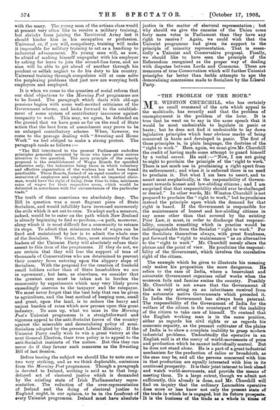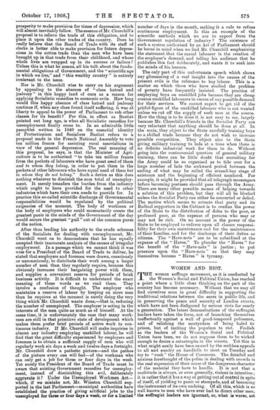"THE PROBLEM OF THE HOUR."
R. WINSTON CHURCHILL, who has certainly no small command of the arts which appeal to the multitude, has recently said that the problem of unemployment is the problem of the hour. It is true that he went on to say in the same speech that it would be most undesirable to legislate in panic or haste ; but he does not find it undesirable to lay down legislative principles which bear obvious marks of being conceived in haste and developed in panic. The first of these principles is, in plain language, the doctrine of the "right to work." Here, again, we must give Mr. Churchill the credit of having made some attempt to guard himself by a verbal caveat. He said :—" Now, I am not going to-night to proclaim the principle of the right to work. There is not much use in proclaiming a right apart from its enforcement; and when it is enforced there is no need to proclaim it. But what I am here to assert, and to assert most emphatically, is the responsibility of Govern- meat towards honest and law-abiding citizens ; and I am surprised that that responsibility should ever be challenged or denied." In other words, Mr. Winston Churchill is not prepared to proclaim the "right to work," but he proclaims instead the principle upon which the demand for that right is based. If the Government is responsible for the maintenance of honest and law-abiding citizens in any sense other than that covered by the existing Poor Law, it must, in order to discharge that responsi- bility, concede something which in practice would be indistinguishable from the Socialist "right to work." For the Socialists themselves always, with great frankness, put forward the "right to maintenance" as an. alternative to the "right to work." Mr. Churchill merely alters the phrase and the point of view. He proclaims the responsi- bility of the Government, which involves the correlative right of the citizen.
The example which he gives to illustrate his meaning only makes his proposition the more dangerous. He refers to the case of India, where a benevolent and autocratic Government organises relief works when the monsoon fails and famine smites the country. Possibly Mr. Churchill is not aware that the Government of India is only acting on an inheritance received from the autocratic native Governments which preceded it. In India the Government has always been paternal. The responsibility of the Government of India for the welfare of the citizen is the counterpart of the inability of the citizen to take care of himself. To contend that the English working man is in the same position, either as regards his civil rights or as regards his economic capacity, as the peasant cultivator of the plains of India is to show a complete inability to grasp modern industrial problems. Undoubtedly the operative in an English mill is at the mercy of world-movements of price and. production which he cannot individually control. But he does not stand alone. He is a part of a great industrial mechanism for the production of calico or broadcloth, as the case may be, and all the persons concerned with him in that production are equally interested with him in its continued prosperity. It is their joint interest to look ahead and watch world-movements, and' provide the means of meeting them. To a large extent, though we admit not sufficiently, this already is done, and Mr. Churchill will find on inquiry that the ordinary Lancashire operative does more or less know not only the present state of the trade in which he is engaged, but its future prospects. It is the business of the trade u a whole in times of prosperity to make provision for times of depression, which will almost inevitably follow. The essence of Mr. Churchill's proposal is to relieve the trade of this obligation, and to place it upon the other trades of the country. Does lie really believe that the Board of Trade with its staff of clerks is better able to make provision for future depres- sions in the cotton trade than the men who have been brought up in that trade from their childhood, and whose whole lives are wrapped up in its success or failure ? Unless this is what be means, all his talk about the funda- mental obligations of Government, and the "scientific age in which we live," and "this wealthy country" is entirely irrelevant to the issue.
Nor is Mr. Churchill wise to carry on his argument by appealing to the absence of "class hatred and jealousy" in this happy land of ours as a reason for applying Socialistic remedies to economic evils. How long would this happy absence of class hatred and jealousy continue if, when any class found itself suffering, it was at liberty to appeal to the power of Parliament to rob other classes for its benefit? For this, in effect as Bastiat pointed out long ago, is what all Socialistic remedies for unemployment finally come to. In an admirable little pamphlet written in 1849 on the essential identity of Protectionism and Socialism Bastiat refers to a proposal made in the French National Assembly to vote ten million francs for assisting rural associations in view of the general depression. The real meaning of this proposal, he says, is that the Minister of Agri- culture is to be authorised "to take ten million francs from the pockets of labourers who have greet need of them and to whom they belong, in order to put them in the pockets of other labourers who have equal need of them but to whom they do not belong." Such a device as this does nothing whatever to diminish the sum total of unemploy- ment. It merely transfers the burden from the industry which ought to have provided for the need to other industries which have their own needs to provide for. In practice this so-called scientific discharge of Governmental responsibilities would be regulated by the political exigencies of the moment. The body of workmen or the body of employers who could momentarily create the greatest panic in the minds of the Government of the day would secure the greatest "pull" out of the common purse of the nation.
After thus lending his authority to the crude schemes of the Socialists for dealing with unemployment, Mr. Churchill went on to demonstrate that he has equally accepted their inaccurate analysis of the causes of irregular employment. In a passage which we cannot think it was wise for a President of the Board of Trade to deliver, he stated that employers and foremen were drawn, consciously or unconsciously, to distribute their work among a larger number of men than they regularly require, because this obviously increases their bargaining power with them, and supplies a convenient reserve for periods of brisk business activity. It is difficult to understand the exact meaning of these words as we read them. They involve a confusion of thought. The employer who maintains a reserve of labour by keeping on more men than he requires at the moment is surely doing the very thing which Mr. Churchill wants done,—that is, reducing the number of unemployed. The employer is acting in the interests of the men quite as much as of himself. At the same time, it is unfortunately the case that many work- men are still in that primitive state of development which makes them prefer brief periods of native work to con- tinuous industry. If Mr. Churchill will make inquiries in almost any industry employing unskilled labour, he will find that the great difficulty experienced by employers and foremen is to obtain a sufficient supply of men who will regularly work six days a week and twelve days a fortnight. Mr. Churchill drew a pathetic picture—and the pathos of the picture every one will feel—of the workman who can only get a job for three or four days in the week. Yet surely the President of the Board of Trade must be aware that existing Government remedies for unemploy- ment, instead of diminishing this evil, deliberately aggravate it? Under the Unemployed Workmen Act— which, if we mistake not, Mr. Winston Churchill sup- ported in the last Parliament—municipal authorities have established the practice of giving artificial jobs to the unemployed for three or four days a week, or for a limited number of days in the month, making it a rule to refuse continuous employment. Is this an example of the scientific methods which we are to expect from the Government regulation of industry ? The existence of such a system authorised by an Act of Parliament should be borne in mind when we find Mr. Churchill emphasising the statement that the casual labourer is the creation of the employer's demand, and telling his audience that he publishes this fact deliberately, and wants it to soak into the minds of his hearers.
The only part of this unfortunate speech which shows any glimmering of a real insight into the causes of the present evils is the reference to boy labour. This is a matter on which those who have studied the problem of poverty have frequently insisted. The practice of employing boys on unskilled jobs because they are cheap creates unskilled labourers in excess of any possible demand for their services. We cannot expect to get rid of the pitiful•figure of the unskilled labourer who is not wanted unless we cut off the supply of such men at the source. How the thing is to be done it is not easy to see, largely because Mr. Churchill's friends in the Socialist Party are very reluctant that anything should be done at all. In the main, they object to the State carefully training boys to a skilled trade because they do not wish to increase possible competition. They object also to the State giving military training to lads at a time whon there is no definite industrial work for them to do. Without going into the controversial question of general military training, there can be little doubt that recruiting for the Army could be so organised as to tide over for a large number of lads the awkward period between the ending of what may be called the errand-boy stage of existence and the beginning of efficient manhood. For example, it might be provided that all telegraph messengers before becoming postmen should pass through the Army. There are many other possible means of helping towards a solution of this problem, but they will all be blocked unless the Socialist Party can either be converted or defied. The motive which seems to actuate that party and its Radical supporters in the Cabinet is to confine the power of the State to the distribution of doles to the poor, or professed poor, at the expense of persons who may or may not be rich. On no account is the power of the State to be employed to enforce upon all classes responsi- bility for their own maintenance and for the maintenance of their families, and for the discharge of their duties as citizens. The " Have-nots " are to be subsidised at the expense of the "Haves." To plunder the " Haves " for the benefit of the " Have-nots " is justice ; to put pressure upon the " Have-nots " so that they may themselves become " Haves " is tyranny.















































 Previous page
Previous page